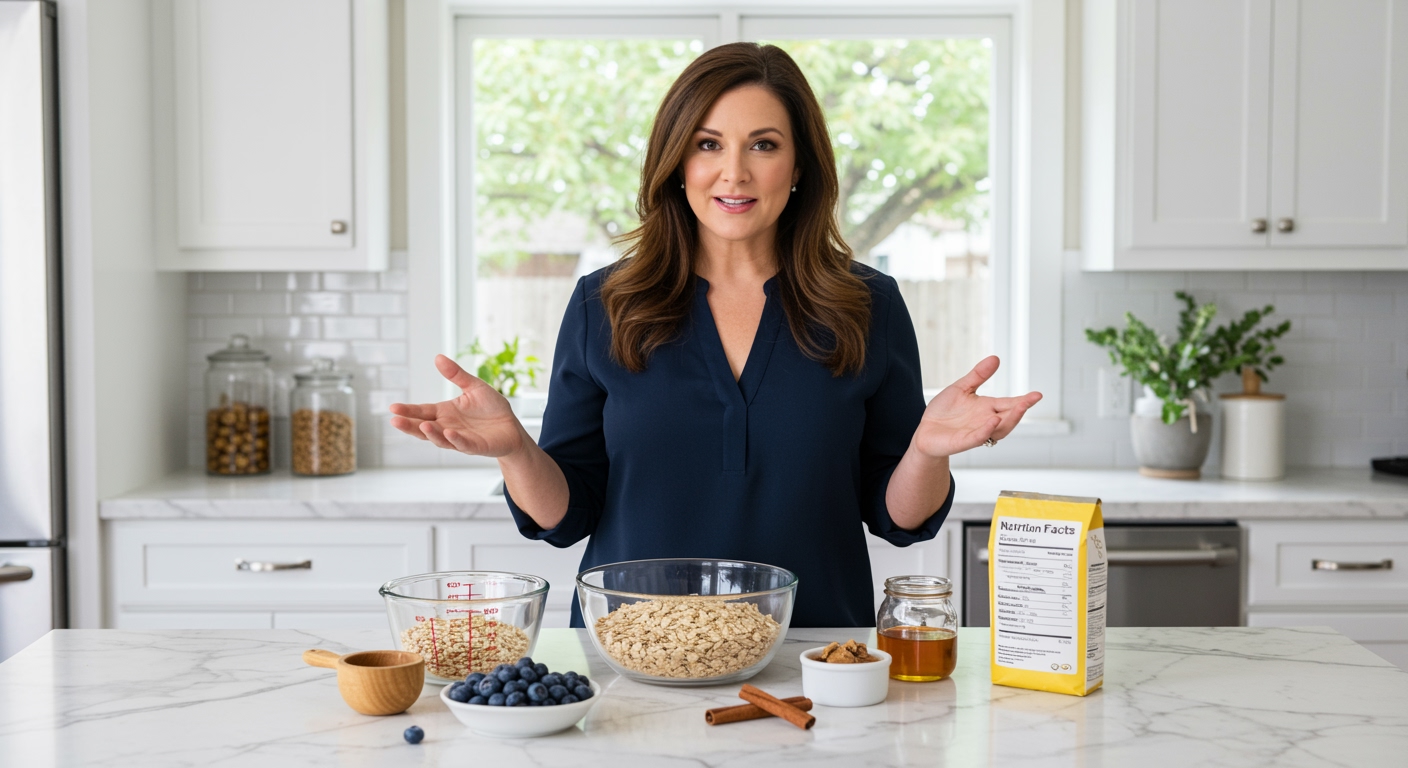✪ Key Takeaway: Oatmeal contains moderate carbs but its fiber content and preparation method matter more than total carb count for PCOS.
Introduction
You wake up craving a warm bowl of oatmeal but then remember someone told you carbs are evil for PCOS.
This confusion happens because most advice focuses on eliminating entire food groups instead of understanding how different foods actually affect your body.
Hi, I’m Abdur, your nutrition coach and today I’m going to explain whether oatmeal’s carb content really makes it unsuitable for PCOS management.
How Many Carbs Does Oatmeal Actually Contain?
One cup of cooked oatmeal contains approximately 28 grams of carbohydrates.
This amount represents about 9-10 percent of your daily carb intake if you follow a moderate carb approach.
The carbs in oatmeal come primarily from complex starches and natural sugars that your body processes differently than refined sugars.
Steel-cut oats contain slightly fewer carbs per serving compared to instant varieties because they undergo less processing.
The fiber content in oatmeal actually slows down how quickly these carbs enter your bloodstream.
This slower absorption helps prevent the rapid blood sugar spikes that can worsen PCOS symptoms.
✪ Fact: Oatmeal has a lower glycemic index than white bread despite containing similar carb amounts per serving.
Why Does Fiber Content Matter More Than Total Carbs?
One cup of oatmeal provides about 4 grams of soluble fiber that directly impacts how your body handles the carbohydrates.
This soluble fiber forms a gel-like substance in your digestive system that slows glucose absorption.
Women with PCOS often struggle with insulin resistance, making this slower glucose release particularly beneficial.
The fiber also helps you feel full longer, reducing the likelihood of overeating later in the day.
Research shows that soluble fiber can improve insulin sensitivity over time when consumed regularly.
This improvement in insulin function can help reduce some of the metabolic challenges associated with PCOS.
✪ Pro Tip: Add a tablespoon of ground flaxseed to your oatmeal to boost fiber content even further.
Does The Type of Oats Change The Carb Impact?
Steel-cut oats undergo minimal processing and retain more of their natural fiber structure.
This intact structure means your digestive system works harder to break them down, resulting in a slower glucose release.
Instant oats are pre-cooked and rolled thinner, making them digest much faster than steel-cut varieties.
The faster digestion of instant oats can cause blood sugar spikes that may trigger insulin responses.
Old-fashioned rolled oats fall somewhere in the middle, offering a good balance between convenience and blood sugar control.
The cooking method also matters because longer cooking times can break down more of the fiber structure.
✪ Note: Overnight oats made with rolled oats can be just as blood sugar friendly as cooked steel-cut oats.
What Should You Add To Oatmeal For PCOS Benefits?
Adding protein and healthy fats to your oatmeal further slows down carbohydrate absorption.
Greek yogurt, nuts, or seeds provide protein that helps stabilize blood sugar levels throughout the morning.
Cinnamon contains compounds that may improve insulin sensitivity and add natural sweetness without extra carbs.
Berries add antioxidants and fiber while providing natural sweetness with a lower glycemic impact than other fruits.
Avoid adding honey, maple syrup, or brown sugar as these will spike your blood glucose levels quickly.
A tablespoon of almond butter or chopped walnuts provides healthy fats that support hormone production.
✪ Pro Tip: Prepare overnight oats with chia seeds and Greek yogurt for maximum protein and fiber benefits.
When Should You Avoid Oatmeal With PCOS?
Some women with severe insulin resistance may need to limit oatmeal during their initial metabolic healing phase.
If you experience significant blood sugar spikes after eating oatmeal, consider reducing portion sizes first.
Women following very low carb or ketogenic approaches for PCOS management should avoid oatmeal temporarily.
Flavored instant oatmeal packets contain added sugars that can worsen insulin resistance and should be avoided completely.
If oatmeal consistently triggers cravings for more carbs throughout the day, you may need to adjust your approach.
Monitor your individual response because PCOS affects each woman differently based on genetics and lifestyle factors.
✪ Note: Track your blood sugar response to oatmeal for one week to determine your individual tolerance level.
The Bottom Line
Oatmeal is not too high in carbs for most women with PCOS when prepared and portioned correctly.
The quality of carbs matters more than the quantity when managing PCOS symptoms effectively.
I would love to hear about your experience with oatmeal and PCOS in the comments below, or share any questions you might have about incorporating whole grains into your eating plan.
References
At NutritionCrown, we use quality and credible sources to ensure our content is accurate and trustworthy. Below are the sources referenced in creating this article:
- Smart Fertility Choices: Is Oatmeal Good for PCOS
- PubMed: Dietary fiber intake and risk of type 2 diabetes
- Plate and Canvas: Carbs and PCOS All Your Questions Answered
- Be Balanced Nutrition: Is Oatmeal Good for PCOS Nutrition Expert Answers





